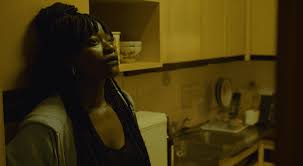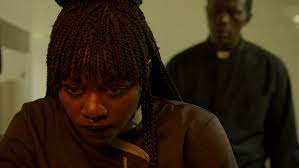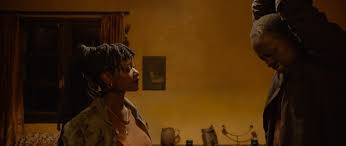Breathless suspense and a powerful performance of internalized trauma and barely-hidden rage by Babetida Sadjo make “Our Father, the Devil” a thriller that stands out from the pack.
It’s the story of a conflict zone refugee suddenly confronted by a man she thinks is a former warlord, a woman triggered into taking action against the monster who slaughtered her family and enslaved her in her African past.
Cameroonian actress turned writer-director Elle Foumbi’s debut feature has echoes of “Death and the Maiden,” the Sigourney Weaver/Ben Kingsley film based on Chilean Ariel Dorfman’s play. But this time the story is Afro-French, the victim now a West African chef in a nursing home and the man she’s sure destroyed her past and scarred her life a new Catholic priest ministering to the residents.
Beautiful Marie mostly keeps to herself at work, running a three person kitchen for her elderly clientele, always sitting outside alone when she stops for a coffee, glass of wine and a smoke at a local cafe. The waiter (Franck Saurel) may try to flirt, or at least engage her in chit chat.
That’s her cue to leave a tip and walk alway. Always. Any man who approaches her earns a look of disdain, or a wary reach for the knife she keeps in her purse.
Marie may live in Luchon, a resort town along the French border with Spain, serving food that would be the envy of any nursing home anywhere in the world. Because they may be old, but they are French, after all. They take their meals seriously. Her favorite resident may be a retired cooking school teacher (Maëlle Genet) whom she dotes on and who has transformed her from a cook and into a chef.
She can carry on knowing and supportive conversations about men with her roommate, Nadia (Jennifer Tchiakpe), a nurse at the home. But whatever happened back in her never-named West African homeland (Sadjo is from Guinea-Bissau, but most every country in the region has seen brutal civil wars) has left her with a trauma that gives her panic attacks.
When she sees this new priest, she freezes up. When he leads the residents in prayer, she faints. When she comes to, she avoids eye contact as he asks for seconds, compliments her cooking and even comes to her kitchen, after hours, for leftovers.
We’ve seen her Internet search the man she who wiped out her village and gutted her life. “Reported killed” doesn’t jibe with her undimmed memories of 20 years before, the eyes, speech and mannerisms she remembers. Does her recognize her?
In a flash, she snaps. And when he wakes up, he’s hog-tied on a remote, mountainside chateau, facing a woman who calls him “Sogo” despite his protests that she’s got the wrong man.
“The police will come looking for me,” he pleads, in French with English subtitles.
“You’re a Black immigrant. No one will come. No one will look very hard.”
She seems positive, but he’s very convincing. She tests him with her native tongue, Mandinka. She makes promises that are lethal threats.
“Get comfortable. You’re not leaving here alive.”
She relates her trauma, her disbelief that he cannot remember her. And she trots out the “commandments” she remembers from her rape, torture and indoctrination.
“Commandment three, ‘You sleep, you die.'”
The set-up may be “Burning Bed” melodramatic, but Foumbi never lets the film tumble into predictability. We see things almost wholly from Marie’s point of view, but get a sense of the human being inside her captor. The plot has its obvious contrivances, but they never take us out of the story and never dictate any predictable “Hollywood” turn.
And the striking Sadjo, of “The Paradise Suite” and “And Breathe Normally” keeps us riveted, reading Marie’s eyes for what she’s feeling and thinking, empathizing with her but rattled enough by her actions to wonder if she’s snapped, that her haunted past caused her to make the mistake that will finish her.
Rating: unrated, violence, sex, nudity
Cast: Babetida Sadjo, Souleymane Sy Savane, Jennifer Tchiakpe,
Martine Amisse, Maëlle Genet and Franck Saurel
Credits: Scripted and directed by Ellie Foumbi. A Cinedigm release.
Running time: 1:49




